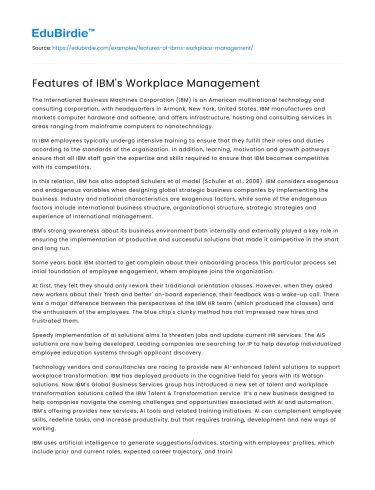The International Business Machines Corporation (IBM) is an American multinational technology and consulting corporation, with headquarters in Armonk, New York, United States. IBM manufactures and markets computer hardware and software, and offers infrastructure, hosting and consulting services in areas ranging from mainframe computers to nanotechnology.
In IBM employees typically undergo intensive training to ensure that they fulfill their roles and duties according to the standards of the organization. In addition, learning, motivation and growth pathways ensure that all IBM staff gain the expertise and skills required to ensure that IBM becomes competitive with its competitors.
Save your time!
We can take care of your essay
- Proper editing and formatting
- Free revision, title page, and bibliography
- Flexible prices and money-back guarantee
In this relation, IBM has also adopted Schulers et al model (Schuler et al., 2008). IBM considers exogenous and endogenous variables when designing global strategic business companies by implementing the business. Industry and national characteristics are exogenous factors, while some of the endogenous factors include international business structure, organizational structure, strategic strategies and experience of international management.
IBM's strong awareness about its business environment both internally and externally played a key role in ensuring the implementation of productive and successful solutions that made it competitive in the short and long run.
Some years back IBM started to get complain about their onboarding process.This particular process set intial foundation of employee engagement, whem employee joins the organization.
At first, they felt they should only rework their traditional orientation classes. However, when they asked new workers about their 'fresh and better' on-board experience, their feedback was a wake-up call. There was a major difference between the perspectives of the IBM HR team (which produced the classes) and the enthusiasm of the employees. The blue chip's clunky method has not impressed new hires and frustrated them.
Speedy implementation of aI solutions aims to threaten jobs and update current HR services. The AIS solutions are now being developed. Leading companies are searching for IP to help develop individualized employee education systems through applicant discovery.
Technology vendors and consultancies are racing to provide new AI-enhanced talent solutions to support workplace transformation. IBM has deployed products in the cognitive field for years with its Watson solutions. Now IBM’s Global Business Services group has introduced a new set of talent and workplace transformation solutions called the IBM Talent & Transformation service. It’s a new business designed to help companies navigate the coming challenges and opportunities associated with AI and automation. IBM’s offering provides new services, AI tools and related training initiatives. AI can complement employee skills, redefine tasks, and increase productivity, but that requires training, development and new ways of working.
IBM uses artificial intelligence to generate suggestions/advices, starting with employees’ profiles, which include prior and current roles, expected career trajectory, and training programs completed. The company has also created special training for agile environments.it is using, for example, animated simulations built around a series of ‘personas’ to illustrate useful behaviors, such as offering constructive criticism.
IBM is also embracing agile talent practices and are giving a lot thought to how employees experience the workplace and in some aspects, handling them like customers.
But it has required a shift in mindset. Before, we tended to rely on experts to build our HR programs. Now we bring employees into the design process, co-create with them, and iterate over time so that we meet people’s needs.
IBM also relying more heavily on technology to find and track candidates who are well suited to an agile work environment.
To keep things moving, the team focuses on vacancies that have cleared all the hurdles, no requisite get started if debate is still ongoing about the desired attributes of candidates. Openings are ranked, and the team concentrates on the top-priority hires until they are completed. It works on several hires at once so that members can share information about candidates who may fit better in other roles. The team keeps track of its cycle time for filling positions and monitors all open requisitions on a Kanban board to identify bottlenecks and blocked processes.






 Stuck on your essay?
Stuck on your essay?

